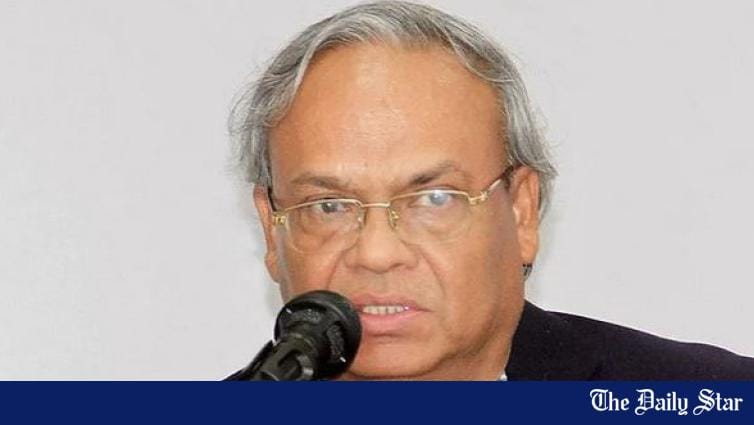Through advanced coal-intensive technologies, the government is trying to keep coal alive and further expand the domestic use of imported LNG.

www.thedailystar.net
Bangladesh's Energy Backtrack
Decoding the Integrated Energy and Power Master Plan 2023
The freshly approved IEPMP seems to chalk out the coal transition from imported to domestic coal rather than transitioning from fossil fuel to renewable or clean energy. FILE PHOTO: RAJIB RAIHAN
The Ministry of Power, Energy, and Mineral Resources (MPEMR) published the Integrated Energy and Power Master Plan (IEPMP) 2023 on November 27 last year. The IEPMP was passed after revising the draft seven times.
The final draft has been widely disseminated among stakeholders. But despite multiple revisions, the IEPMP fails to demonstrate a coherent plan to attain renewable energy transition while ensuring energy security. Instead, an overwhelming presence of different advanced technologies (such as nuclear, carbon capture and storage units, hydrogen, and ammonia) have been observed. The majority of these technologies commit to clean coal and are yet to be tested for their effectiveness in reducing carbon emissions. Such a shift in narratives creates confusion among the masses regarding the government's renewable energy stance. This type of jargonal change hints at the government's willingness to keep fossil fuel use, especially of coal, alive.
Renewable energy targets in IEPMP
The progress in renewable energy deployment in Bangladesh has been sluggish for quite some time. According to SREDA, the renewable energy generated power in Bangladesh is 1,202 MW, and the total share stands at 4.1 percent. The lion's share of current renewable energy is from solar (both off-grid and on-grid), as 968 MW is generated from solar energy in Bangladesh. However, aligning with the prime minister's announcement, the newly launched IEPMP sets the clean energy target at 40 percent of the total installed generation capacity (23,500 MW) by 2041. Unfortunately, the new IEPMP faultily revised renewable energy to clean energy, where targets are set as 18 percent by 2030 and 40 percent by 2041. The share of renewable energy within the clean energy mentioned in the IEPMP is not even half. By 2030, of the 18 percent clean energy, 5.7 percent (1,726 MW) will be renewable, and by 2041 of the 40 percent clean energy, only 8.8 percent (5,157 MW) will be from renewable energy sources. Now, the billion-dollar question is: what makes up the remaining 12.3 percent by 2030 and 31 percent by 2041?
Emphasis on technology for clean energy goals
The IEPMP mentions the use of advanced technology and fuel cells to achieve clean energy targets. It includes coal-fired power plants with Carbon Capture and Storage (CCS) technology, nuclear, coal co-fired with ammonia, and hydrogen co-fired with gas (LNG) as clean energy sources. The plan explicitly mentions that to achieve the goal of 40 percent of electricity generated from clean energy sources, it will be necessary to introduce hydrogen (H2) at six percent and ammonia (NH3) at two percent.
The rationale of the MPEMR behind introducing these technologies is that Bangladesh will not be able to achieve the clean energy goals via traditional renewable energy sources. This itself seems to contradict the estimation of renewable energy potential in Bangladesh presented in the final IEPMP. According to the renewable energy generation deployment plan under the Advanced Technology Scenario (ATS), 9,500 MW can be generated from solar and 7,575 MW can be generated from wind. Biomass can generate 165 MW, with 230 MW of hydropower. Hence, a total of 17,470 MW can be generated from traditional renewable energy sources by 2041, which is almost 30 percent of the total power demand.
Timeline of hydrogen and ammonia introduction
The freshly approved IEPMP lays out the plan to introduce ammonia co-firing as early as 2035 and coal co-firing as early as 2037. Gas-fired power plants with 20 percent hydrogen co-firing will be starting in 2037. Later, it will be upgraded to 50 percent in 2045 and 100 percent hydrogen firing starting in 2040. The plan will introduce blue hydrogen first, but it has not yet confirmed whether green hydrogen will be introduced or not. In the case of ammonia, coal-fired power plants with 20 percent NH3 co-firing will be starting in 2035 and will be upgraded to 50 percent in 2040. After 2037, the introduction of CCS into ammonia co-firing should also be considered to further reduce CO2 emissions.
Environmental and financial feasibility of hydrogen and ammonia
Hydrogen and ammonia co-firing with gas and coal are not 100 percent clean and do emit carbon. Fuel cells such as hydrogen and ammonia are only environment-friendly and emit zero carbon if they are green; that is, constructed from renewable sources. Hence, only if green hydrogen and ammonia are used for power generation will Bangladesh be able to keep up with the energy transition commitment. Even if the MPEMR ends up using green hydrogen and ammonia for electricity generation, it will not be financially viable. Several pieces of literature have already demonstrated that the levelised cost of electricity (LCOE) from these sources is much higher than in traditional renewable energy sources. The IEPMP itself demonstrates that the LCOE from ammonia is USC 17/kWh and USC 14/kWh for hydrogen. In contrast, the LCOE for solar will be USC 2.7/kWh in 2030 and USC 2.1/kWh in 2050. The required investment amount of the generation capacity installations till 2050 in the IEPMP is estimated at $157 billion. The total investment for power generation from clean energy is $64.4 billion, of which it's $29.7 billion for wind (46 percent), $20.1 billion for nuclear (31 percent), $7.2 billion for solar (12 percent), and $6.9 billion for hydrogen and ammonia (11 percent).
Lack of renewable energy planning
CCS, ammonia, and hydrogen technologies are costly and will require hefty investment to be introduced in Bangladesh. There is no detailed plan of the necessary financial estimates for investment and maintenance of renewable or clean technologies that could be used to attain the goal of low carbon emissions. Additionally, there is no accurate policy framework for renewable energy subsidies yet. Several government decisions on renewable energy, such as the decision to phase out diesel-based power plants, as well as medium-term plans for installing solar PVs in agriculture, irrigation, and primary schools are not mentioned or reflected in the IEPMP. No feasibility study is proposed for renewable energy-related implementation in various spheres of the economy.
On the other hand, in the section that highlights power policies, renewable or clean energy policies are completely absent. Instead, a plan for the hydrogen/ammonia fuel supply system is highly emphasised. The government is planning a demonstration test essential for evaluation in Bangladesh for ammonia co-firing and studies on plant locations, transmission, and fuel supply for hydrogen. The schedule for CCS implementation for gas-fired plants and the need for preliminary studies on suitable sites and CCS technologies are already in the works.
De facto coal transition
Through advanced coal-intensive technologies, the government is trying to keep coal alive and further expand the domestic use of imported LNG. The new IEPMP unreasonably assumes that domestic coal production will continue to increase by 2050. This is mainly for ammonia co-fired with coal and CCS technologies to clean coal. Overall, the freshly approved IEPMP seems to chalk out the coal transition from imported to domestic coal rather than transitioning from fossil fuel to renewable or clean energy. This indicates that the government is willing to start walking in the opposite direction of renewable energy targets.
Dr Khondaker Golam Moazzem is research director at Centre for Policy Dialogue (CPD).
Helen Mashiyat Preoty is research associate at CPD.








